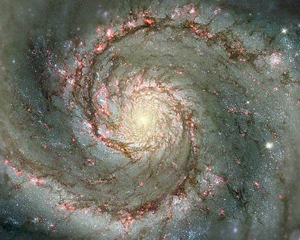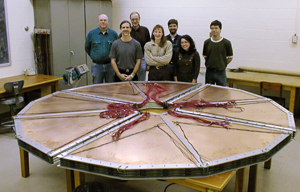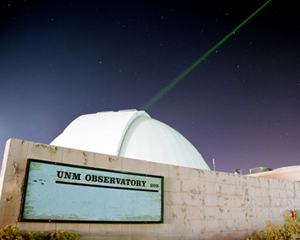Physics & Astronomy
The Physics and Astronomy Department at UNM offers opportunities in physics, optics, and astronomy/astrophysics.
CAREER OPPORTUNITIES
 An undergraduate education in physics provides a solid foundation for further studies in a variety of disciplines, ranging from any sort of science, to engineering, mathematics, law and medicine, and topics further afield such as political science.
An undergraduate education in physics provides a solid foundation for further studies in a variety of disciplines, ranging from any sort of science, to engineering, mathematics, law and medicine, and topics further afield such as political science.
Students with a degree in physics or astrophysics find employment in high-tech industries as well as research and development laboratories operated by both private industry and various governmental agencies; there is also an important need for scientists in education at both the high school and college or university levels.
Trained to think logically and to unravel how things work, and consider how to make them work better, our graduates also enter successful professional careers in diverse areas like computing, investment banking, writing for the public, and advising political figures, to name a few. Our students often advance to leadership positions in industrial, research, and academic settings.
UNDERGRADUATE PROGRAM
- B.S. Physics
- B.S. Astrophysics
- B.A. Physics and Astrophysics
- B.S. Physics and Electrical Engineering
- B.A. Physics and Electrical Engineering
- B.S. Physics with Biophysics Concentration
- B.S. Physics with Earth and Planetary Sciences Concentration
- B.S. Physics with Optics Concentration
A fundamental scientific background, good for entry into many scientific and engineering careers, is the chief appeal of a physics or astronomy undergraduate degree. Each of our degrees provides students with a basic foundation of knowledge in physics and astronomy. The degree programs also seek to develop in students an ability to analyze and solve scientific problems and provide students with important employment and technical skills, such as the ability to use mathematics and computers effectively; a facility with electronics and electronic devices; and effectiveness in oral and written communications.
 The goals of the B.S. degrees are to prepare students for:
The goals of the B.S. degrees are to prepare students for:
- Advanced studies in physics, optics, astrophysics, and related fields such as engineering, applied mathematics, biophysics, and medical physics
- Employment in industrial, government, or academic settings
In contrast, the goal of the B.A. degree is to prepare students for careers in various nonscientific areas where a scientific background is useful, examples being law, general education, science writing, business, finance, history, and philosophy.
GRADUATE PROGRAM
- M.S. in Physics
- M.S. in Optical Science and Engineering
- M.S. in Physics with Astrophysics Concentration
- Ph.D. in Physics
- Ph.D. in Optical Science and Engineering
- Ph.D. in Physics with Astrophysics Concentration
The Department's graduate degree programs are thoroughly integrated into the ongoing research efforts here. These programs provide excellent opportunities for graduate-level coursework and research in many areas of theoretical and experimental physics. Approximately 100 graduate students currently are pursuing studies in one of these programs. These students are supported by teaching assistantships and by external research funds which exceed several million dollars per year.
In recognition of the interdisciplinary breadth of optics as a field of science and engineering, the optics degrees are administered jointly with the Department of Electrical and Computer Engineering. Also interdisciplinary in scope, a new biomedical physics concentration emphasizing this rapidly emerging area has been created.
The Department's research programs are highly visible, with national and international reputations. There has been an average of 11 PhD graduates per year for the last ten years, which is nearly twice the national average.
FACILITIES
 The Department's lecture hall for beginning classes has a large array of demonstration equipment, including a heliostat that projects an image of the sun onto a wall for the study of sun spots or the spectrum of light coming from the sun.
The Department's lecture hall for beginning classes has a large array of demonstration equipment, including a heliostat that projects an image of the sun onto a wall for the study of sun spots or the spectrum of light coming from the sun.
It also has a system for electronic recording and immediate analysis of individual student responses to questions posed during class time.
In addition, we maintain a Campus Observatory for students and the public.
State-of-the-art research laboratories are used by our faculty and students to perform research ranging from ultrashort laser pulses to exploring biophysical processes in cells, and from very-low-temperature experiments for tests of fundamental physics in space to development of novel particle detectors.
The Department is in close proximity to several national research institutions and laboratories including Sandia National Laboratories, Los Alamos National Laboratory, the Air Force Research Laboratory, and the National Radio Astronomy Observatory, with which students and faculty have numerous research collaborations. The Department also serves the labs by training doctoral researchers for the labs' technical staffs, some of whom ultimately move into important management positions.
STUDENT OPPORTUNITIES
Our students come from many different backgrounds, and the Department is small enough so they can get to know each other and the faculty well. They have a great many interests in addition to physics and are often involved in other programs on campus as well. These varied interests can also lead to involvement in individual research projects with faculty.
The opportunities to learn and study in our Department are limitless. Our undergraduate and graduate students can take advantage of several exchange programs with universities and research institutions abroad. A busy colloquium and seminar schedule keeps us informed about the latest developments in the world, by the leaders of their respective fields.
All students are encouraged to participate in our research laboratories both during the academic year and the summer. Some programs for undergraduates include:
- A summer Research Experiences for Undergraduates (REU) program offering research opportunities in diverse areas of physics and astronomy
- Our nationally recognized and very active chapter of the Society of Physics Students welcomes new members, and engages their curiosity about the world in ways that they characterize as "Having Fun with Physics."
FACULTY
The Department has a distinguished group of over 30 regular faculty and lecturers, approximately 10 research faculty members, and several adjunct faculty. The Department is also actively associated with scientists at many nearby scientific laboratories, including national research facilities, with which many of the adjunct faculty are affiliated. These faculty members are involved in cutting-edge research in areas that reflect the diversity of our discipline:
- Astronomy and Astrophysics
- Biomedical physics
- Condensed-matter physics
- Optics and photonics
- Quantum information science
- Subatomic physics
- Other areas include geophysics, nonlinear physics, and complex systems
We are very proud that our faculty members are devoted to high-quality teaching at both the undergraduate and graduate levels. Students and faculty interact in an open and inspiring atmosphere, which provides the personal attention all of our students deserve.
FOR MORE INFORMATION
For information about the Department of Physics & Astronomy, as well as graduate student admission, please contact:
Department of Physics and Astronomy MSC07 4220
1 University of New Mexico Albuquerque, NM 87131-0001
Phone: (505) 277-1512
Fax: (505) 277-1520
pais@unm.edu

 An undergraduate education in physics provides a solid foundation for further studies in a variety of disciplines, ranging from any sort of science, to engineering, mathematics, law and medicine, and topics further afield such as political science.
An undergraduate education in physics provides a solid foundation for further studies in a variety of disciplines, ranging from any sort of science, to engineering, mathematics, law and medicine, and topics further afield such as political science.  The goals of the B.S. degrees are to prepare students for:
The goals of the B.S. degrees are to prepare students for: The Department's lecture hall for beginning classes has a large array of demonstration equipment, including a heliostat that projects an image of the sun onto a wall for the study of sun spots or the spectrum of light coming from the sun.
The Department's lecture hall for beginning classes has a large array of demonstration equipment, including a heliostat that projects an image of the sun onto a wall for the study of sun spots or the spectrum of light coming from the sun.